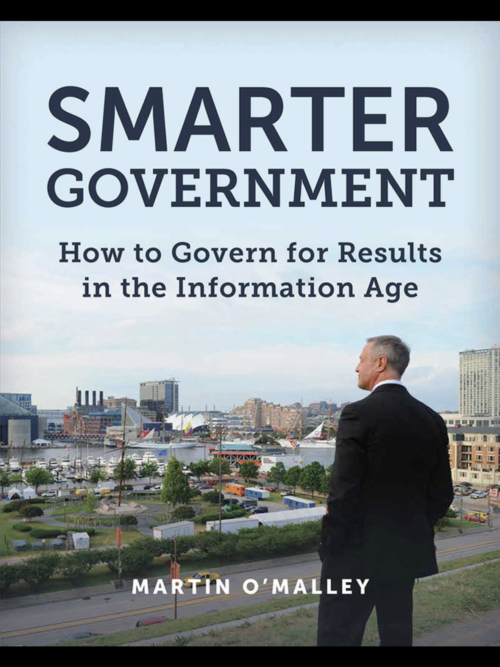Review: “Smarter Government: How to Govern for Results in the Information Age,” by Martin O’Malley
Bill Dennison · | Environmental Report Cards | Science Communication |

In late 2019, former Maryland Governor Martin O’Malley published a book through Esri Press entitled, “Smarter Government: How to Govern for Results in the Information Age”. I had been anticipating the book’s release ever since Gov. O’Malley contacted me about providing material for the chapter, “Restoring Our Waters,” which cites the University of Maryland Center for Environmental Science’s annual Chesapeake Bay report card to help explain the BayStat program. When I finally obtained a copy of the book, I discovered the former governor had written a captivating piece of literature rich in details (319 pp.), compelling images, valuable advice, and relevant examples.
Martin O’Malley describes a new model for governance in the book’s initial chapters. Inspired by the successful CompStat program in New York City, an initiative pioneered by Jack Maple to fight crime, O’Malley adapted this model to combat crime in Baltimore after being elected Mayor in 1999. Initial successes in reducing crime led O’Malley to expand the ‘stat-ing’ model to all city services, which became known as CitiStat. When O’Malley was elected Governor, he expanded this approach to form StateStat, and each of these steps in the evolution of ‘stat-ing’ or ‘Performance-Stat’ is detailed in the book. At its core, ‘Performance-Stat’ uses data to make decisions. ‘Performance-Stat’ relies heavily on maps, thus the connection with it being published by Esri, the California-based company that produces the widely used mapping ArcGIS software.
O’Malley provides the central tenets of this ‘Performance-Stat’ approach:
- Performance management and data-driven decision-making
- GIS technology
- Customer service technology (e.g., 311 call number for city services)
- Collaborative circles of caring people making informed decisions
- Openness and transparency
- Getting things done by bringing people together regularly
In person,
O’Malley often emphasized transparency and accountability with relentless follow-up, and these
features were evident in the BayStat meetings I attended.
Following the initial chapters documenting the evolution of ‘Performance-Stat’, O’Malley describes employment of this approach towards a range of societal facets. These include improving education, health, and well-being, restoring our waters, preserving our land, and protecting our air. Through my involvement with BayStat I was able to observe and participate in the environmental activities spurred by the governor, and witnessed measurable improvements in the Chesapeake Bay. These improvements have been publicized in previous IAN blogs.

In the
final two chapters, O’Malley argues that leadership is an art, and politics is
a game of timing, character and chance, but effective
governance is a science. No wonder I became enamored with BayStat—it is
because I love science!
O’Malley recalls that George Washington was a surveyor and mapmaker who espoused accountability and efficiency in government. O’Malley advocates creation of a FedStat, which would use data-driven decision-making at a national level. He also discusses worldwide governance indicators and the United Nations Sustainable Development Goals (SDGs). Coincidentally, IAN has recently begun discussions with WWF partners on developing universal environmental indicators that could inform the SDGs. O’Malley also discusses the Genuine Progress Indicator (GPI) to replace the Gross Domestic Product (GDP) metric, which is very forward thinking.
Martin
O’Malley is a natural teacher. He invited me to participate in a class that he
taught at the University of Maryland and I got to see him in a packed classroom
of over 200 students who were captivated by him. His teaching prowess is
evident in “Smarter Government”, as he clearly explains complex concepts,
including breakout boxes and examples. In the appendices, he provides
thought-provoking study and discussion questions, along with self-guided
Geographic Information System exercises. This would be a great textbook for the
new generation of civic leaders who embrace technology and want to make
government effective.

Many politicians use ghost-writers or staffers to draft content. In contrast, in “Smarter Government”, I can actually “hear” Martin O’Malley’s voice as I read it. This book comes from his soul, and conveys his passion for setting clear goals, measuring progress, and getting things done. I recommend viewing his TEDxMidAtlantic talk, “A New Way of Governing,” to hear the passion in his voice in what can serve as a short summary of “Smarter Government”. O’Malley generously acknowledges that he obtained help in producing this book, but “Smarter Government” is clearly his own creation and ultimately, his life work.
I highly
recommend this book to my scientific colleagues who are disgusted by current
acrimonious politics, if only to paint a picture of what good governance can
be. I also heartily recommend “Smarter Government” to elected officials and
decision makers at all levels of government. It can also be recommended to
citizens of either political persuasion who can apply the principles of “Smarter
Government” to demand effective governance models from their elected officials.
Martin O’Malley has provided us the gift of pulling open the curtain and
showing us the way for effective governance.
About the author
Bill Dennison

Dr. Bill Dennison is a Professor of Marine Science and Vice President for Science Application at the University of Maryland Center for Environmental Science.